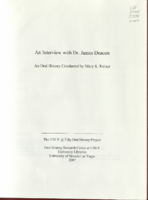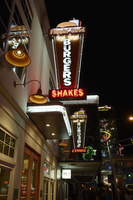Search the Special Collections and Archives Portal
Search Results

Transcript of interview with Dr. James Deacon by Mary K. Keiser, August 24, 2006
Date
Archival Collection
Description
Text

Transcript of interview with Mary Laub by Wendy Starkweather, December 02, 2013
Date
Archival Collection
Description
Text

Interview with NDE Immersion Group, January 13, 2006
Date
Archival Collection
Description
Text

Andres Dominguez oral history interview: transcript
Date
Archival Collection
Description
Oral history interview with Andres Dominguez conducted by Marcela Rodriguez Campo, Laurents Bañuelos-Benitez, and Barbara Tabach on February 11, 2019 for the Latinx Voices of Southern Nevada Oral History Project. In this interview, Dominguez discusses his upbringing in Las Vegas, Nevada and growing up on the Eastside. He talks about the history of barbering in his family, and his path to becoming a barber. Dominguez describes the process of acquiring the barbershop at the El Cortez Hotel and Casino, and the significance of the location to his family. Lastly, Dominguez discusses his perspective on life, the importance of networking, and his decision in naming his shop Speakeasy Barbershop LV.
Text

Photograph of Flippin' Good Burgers and Shakes sign, Las Vegas (Nev.), June 28, 2017
Date
Archival Collection
Description
Site address: 505 Fremont St
Sign owner: Frederick Mossler. Owned by Honus Capital, Jaimee Oliver principal owner.
Sign details: Opened 2015 used to be Uncle Joes Pizza - closed 2014.
Sign condition: 5, newer sign
Sign form: Blade
Sign-specific description: Orange blade sign over the main entrance, with brown and red accent color. An image of a burger and shake at the top, with the words "burgers" vertical in the center of the sign, and the word "shake" at the very bottom.
Sign - type of display: Neon
Sign - media: Steel
Sign environment: On Fremont Street next to the Griffin and Le Thai. At the Intersection of Las Vegas BLVD and Fremont.
Sign manufacturer: Federal Heath
Sign designer: Keith Grossman
Sign - date of installation: Aug. 2015
Sign - artistic significance: Although a new sign, it appears it was meant to mimic diner signs from the 1950s.
Survey - research locations: Email Correspondence with Jaimee Oliver, One of the Principal Officers
Survey - research notes: https://vegas.eater.com/2017/8/8/16110798/flippin-good-burgers-temporary-shutter-remodel
Surveyor: Wyatt Currie-Diamond
Survey - date completed: 2017-09-01
Sign keywords: Blade; Neon; Steel; Plastic; Backlit
Mixed Content
Alpha Kappa Alpha Sorority. Theta Theta Omega Chapter (Las Vegas, Nev.)
Corporate Body Alternate Name
Alpha Kappa Alpha, Incorporated (AKA), is one of the oldest Black sororities in the United States, and was
founded on January 15, 1908 at Howard University in Washington, D.C. AKA is an international service
organization that comprises nearly 300,000 members in over 1,000 graduate and undergraduate chapters
worldwide.
Theta Theta Omega originally started in 1962 when six members of AKA sought to create a graduate
chapter in Las Vegas, Nevada. AKA recruited members by posting notices throughout the Clark County
Corporate Body
Forever in Our Hearts Documentary
Identifier
Abstract
The collection is comprised of a short documentary film,
Archival Collection
Las Vegas Land & Water Company Records from the Las Vegas Valley Water District
Identifier
Abstract
The Las Vegas Land & Water Company Records from the Las Vegas Valley Water District (1918-1989) are primarily comprised of contracts, correspondence, and maps that document the establishment of a water distribution system in Las Vegas, Nevada that would provide water using the state's Colorado River allocation. The records include water main extension agreements, correspondence, and bills of sale for water main construction, as well as articles and correspondence documenting the groundwater shortage in Las Vegas. The collection also includes maps for water distribution systems and pipelines throughout the Las Vegas Valley.
Archival Collection
UNLV Libraries Collection of Circus Circus Hotel and Casino Promotional Materials and Reports
Identifier
Abstract
The UNLV Libraries Collection of Circus Circus Hotel and Casino Promotional Materials and Reports includes annual reports, financial reports, newspaper and magazine clippings, press kits, press releases, and promotional materials for the Circus Circus hotel and casinos in Las Vegas, Nevada, and Reno, Nevada, dating from 1972 to 2006.
Archival Collection

Kaity Webber oral history interview: transcript
Date
Archival Collection
Description
Oral history interview with Kaity Webber conducted by Barbara Tabach on November 16, 2017 for the Remembering 1 October Oral History Project. Kaity Webber describes moving to Las Vegas, Nevada and earning her degree in psychology from the University of Nevada, Las Vegas. Webber discusses the excitement she had going to the Route 91 Harvest festival with a friend on the weekend of the October 1, 2017 Las Vegas shooting. She talks about her experiences from that night, including how she found shelter in the Thomas & Mack Center with countless others, as well as her process of healing from the traumatic event.
Text
